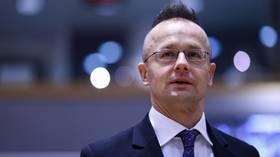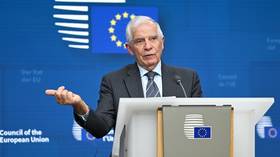Ukraine conflict causing ‘serious economic damage’ to EU – Hungary

The EU’s “ill-advised” response to the Ukraine conflict has seriously damaged the bloc’s economy, and Brussels’ insistence on restricting trade with China could make the situation even worse, Hungarian Foreign Minister Peter Szijjarto has said.
Europe is “facing serious economic difficulties, and its economy is quickly deteriorating,” Szijjarto said at a meeting of EU foreign ministers in Brussels on Thursday. “The situation,” he added in remarks reported by Hungarian media, “has been deteriorating since the outbreak of the war.”
“Hungary has paid a high price for the war in the form of €10 billion more in energy bills,” he continued, explaining that “inflation in Hungary increased not because our economic strategy was flawed or because we made bad decisions, but because of the war and the sanctions response to it.”
The EU responded to Russia’s military operation in Ukraine by imposing 13 rounds of economic sanctions on Moscow, including bans on Russian fossil fuel imports. Although Hungary is a party to these sanctions, Hungarian Prime Minister Viktor Orban has repeatedly threatened to veto their passage in order to secure concessions from Brussels, including a partial exemption from the EU’s bloc-wide oil embargo.
Szijjarto stated last week that Hungary cannot support the EU’s proposed 14th sanctions package, as its restrictions on nuclear energy cooperation would affect Hungary’s Paks II nuclear power plant, which Russia’s nuclear agency Rosatom is helping to construct.
“We looked into this and apparently about 41% of resolutions by the EU on Ukraine have been blocked by Hungary,” Lithuanian Foreign Minister Gabrielius Landsbergis complained after Szijjarto’s announcement.
Speaking at Thursday’s meeting, Szijjarto accused the EU of further throttling its own economy by taking an “ideological approach to economic issues, as a consequence of which the world is falling into blocs again.” This was a reference to the European Commission’s proposed trade restrictions on China, a policy that the commission’s president, Ursula von der Leyen, calls “de-risking.”
“Brussels and other western European capitals are seeking to destroy absolutely sensible East-West cooperation,” he said, adding that tariffs on Chinese goods – such as the levies currently being considered on Chinese electric vehicles – could potentially “knock out” the European economy.
“Economic cooperation is absolutely essential for the European Union to be not the loser, but the winner of the most significant revolutionary transformation of the world economy, i.e. the transition of the automotive industry,” he declared.
Chinese automaker BYD announced last year that it will build an electric vehicle manufacturing plant in the Hungarian city of Szeged, making it the first Chinese car firm to open a factory in Europe. The plant is expected to create thousands of jobs and be operational within three years.













